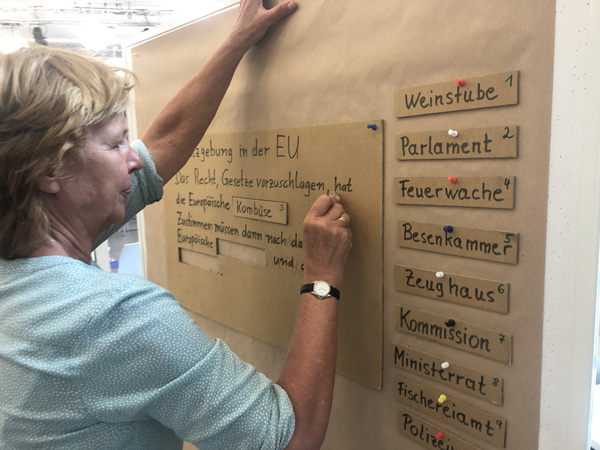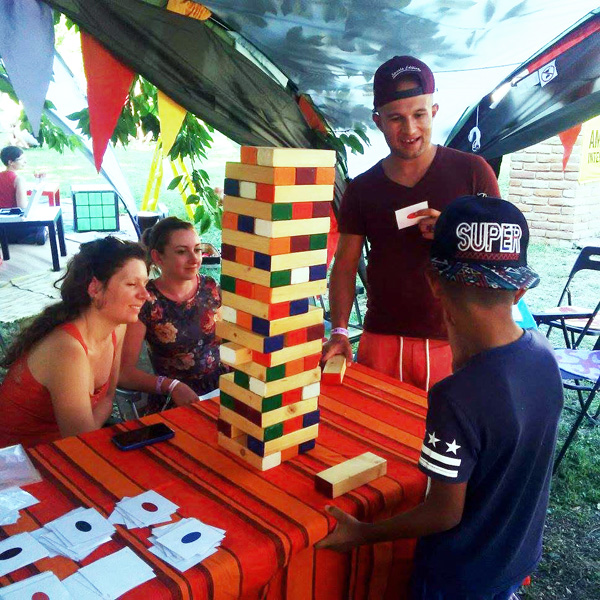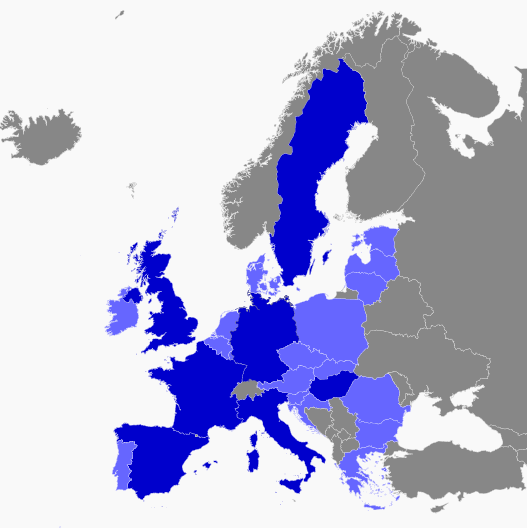By Joseph Karauli, London
Events in the UK have demonstrated clearly: many citizens in European Union (EU) countries are ill-informed about what the EU is, what it does, and how decisions in the EU are made. Mistrust into the idea of international cooperation, and recourse to nationalistic doctrines are ubiquitous. In the now 27 EU member states they may be of different strength, but clearly in all member states anti-EU populism has become an increasing problem.
In the Have Your Say (HYS) project we tackle this problem by developing and testing innovative forms of educational group activities for low-skilled adults. The aim is to enable these adults to reflect their opinions on issues of public interest (including but not limited to the EU), and to help them try to base their decisions on facts rather than myths. In other words, the project is aimed at promoting basic citizenship skills of people with lower formal education.
Have Your Say is a three-year âStrategic Partnershipâ project financed through the Erasmus+ programme of the European Union. The project consortium consists of organisations from seven countries: Germany, Spain, Italy, France, Hungary, Sweden, and the UK. They are either providers of classical adult education, or they are civic organisations offering various community services including specific forms of education, legal services and empowerment. (List of partner organisations: see below.)
 Preparation of first makeshift props for the escape game in Hannover
Preparation of first makeshift props for the escape game in Hannover
Aims of the project
As a result of teaching and learning methods changing (generally reflecting advancements in technology and andragogy), there has been a considerable shift from traditional methods of education typically based on the âclassroomâ setup towards what can be described as âalterna-tive methodsâ of education encompassing a plethora of methodologies such as blended learning, role play, games and other interactive work with groups.
The area of interest which âHave Your Sayâ attempts to explore is what innovative teaching and learning arrangements can be used to help adult learners, especially with lower levels of formal education, to understand the European Union, including its history, the purposes of its various institutions, the direct and indirect effects of its laws on member states and its citi-zens, etc. This organically includes challenging current misconceptions and disinformation regarding the EU and provide easily accessible educational environments to promote fact-based learning. These misconceptions and disinformation may stem from various avenues including opinions formed from subjective experiences, political agendas and general lack of knowledge surrounding the subject. The desired effect is to enable learners to reach their own informed opinions and conclusions on the subject through critical thinking, reflection, open discussion and other engaging activities based on objective and factual information.
A major problem: the EU being complex and abstract
When dealing with the EU as a subject of teaching and learning, there are various challenges. The subject of the EU is generally considered to be complicated. The EU is often character-ised as an institution whose purpose and role is not widely understood, described at times by certain members of the public as undermining national sovereignty and lacking democratic legitimacy . This is further exacerbated by materials and information about the European Union being filled with legalese, political jargon and academic analysis or evaluation. But it is not only the fault of bureaucratic jargon in publications that creates a disconnect between people and the EU. The EU as an idea and a reality is a particularly difficult subject to present in plain language because it is both abstract and remote. It is a âclubâ of national states trying to coordinate their legislation through a complicated system of organisations and procedures. After approximately 150 years of the national state being presented as the world-wide normal, people are well prepared to accept the national state as a given without questioning it in most cases, but want to hear extra justifications for the need of an inter-national organisation that replaces or at least coordinates certain functions of the national state.
In the Have Your Say project we try to tackle this by simplyfying and breaking up the abstract topic of the EU by presenting some tangible effects on citizensâ daily lifes, as well as by allowing learners to explore structures of the EU in the most accessible way possible, with extra care taken in designing materials, resources and activities for an audience with practically no and or limited concrete knowledge of the EU.
One aspect of making the topic accessible to learners is using adequate, simple varieties of speech. One of the first activities in the project was therefore, exploring the state of art of âeasy-to-readâ language concepts in the participating countries. We found that âeasy-to-readâ language concepts, although principally promoted even on the EU-governed platforms for a number of years, still are at very different stages in the various countries, both in terms of theoretical underpinnings and in terms of practical implementation: from âeasy-to-readâ publications being legally required from government bodies in Germany (with particular respect to parts of the population with low litaracy), over such concepts being promoted by civic organisations but not the state (Italy), to countries where the concept so far seems to be altogether ignored (Hungary).
Nonetheless, one of the three main outputs of this project will be published adhering to the âeasy-to-readâ methodologies by all partner countries, in a form of language as good as pos-sible approaching generally accepted criteria for addressing this public, or, where criteria have not yet been developed and popularised, in a an experimental form copying the principles of âeasy-to-readâ in German and English.
Main products
The Have Your Say project consists of achieving and delivering three intellectual outputs across the three-years (33 months) initiative.
Firstly, the starting point of the Have Your Say initiative is to conduct research and explore existing forms of good practice in relation to different education methodologies relating to the subject of the EU (with a specific focus on learners who possess low formal education quali-fications or exposure).
Secondly, to produce a teaching aid that contains factual information on the EU, particularly its history, its multiple institutions and their purposes, the direct and indirect effects of its laws on member states and citizens therein, suitable for a target audience with below-average reading abilities. To this end, the teaching aid will apply the concept of âeasy-to-readâ lan-guage. This publication will be translated into the languages of all partner countries and be accessible to the public in electronic form, thus making it a useful tool for civic education providers with learners that lack basic qualifications, learners who suffer from disabilities or generally struggle to absorb large pieces of complicated information.
Finally, the main component of the project is to develop eight new, innovative learning meth-odologies for European civic education providers for the aforementioned target audience. This can be semestral courses, or weekend courses, or innovative events custom-made for the target audience; all to help them developed their own position on the EU, and base their position on facts rather than hearsay or questionable claims. Each partner organisation will develop one new course or training and test it at least twice (in two consecutive implementations), to allow for evaluation and improvements. The methodologies developed and tested will then be published and thus made available for implementation (or adaptation) by other adult educa-tion providers in Europe.
 Testing the giant Jenga game with VET students at the Nevelök haza courtyard in Pécs, June 2021.
Testing the giant Jenga game with VET students at the Nevelök haza courtyard in Pécs, June 2021.
The European Unionâs stance on Euro-scepticism
The Have Your Say project mirrors the concerns of many European Citizens, but it also relates to the European Commissionâs efforts and initiative to target sources of disinformation and the consequential effects of such exposure on members of the public. This initiative was first introduced early in 2015, and further developments have been made to pursue its imple-mentation.
Due to there being a significant amount of misinformation, disinformation and myths on the EU online, especially on âsocial mediaâ, there is a strong incentive to challenge existing mis-conceptions and enable learners to identify sources of misinformation and thus make their own calculated decision as to whether they should accept or reject that information.
In 2018, the European Commission set up a high-level group of experts to identify, evaluate and create solutions to problems arising from âdisinformationâ, specifically risks to âdemo-cratic, societal and economic realisationâ. This is balanced with the continual promotion of freedom of expression and freedom to receive and impart information.
Public opinion in the EU.
A 2019 survey by Pew Research Centre researched the levels of EU scepticism in several European countries. The study found that âfavourable opinion of the EUâ prevails in Hunga-ry with 67 % of population, which interestingly is exactly what the median across Europe was at the time. In France, the positive attitude meanders heavily between 40% and 60% over the years, depending on the general political environment. In Sweden positive attitude grew from 50% in 2016 to72 % in 2019. In Germany it went down in 2015 from previously over 60% to 50%, arguably due to the correlation of Syrian refugees arriving in the country, but then went back up to nearly 70% in 2019. Italy seems to be more stable in its EU reception with close to 60% positive throughout the years, with minor shifts. Finally, Spain underwent a large cup-shaped arc from 80% in 2007 to 50% in 2013, and since then constantly growing to 66 per cent in 2019.
This demonstrates the changing attitudes towards the European Union whilst simultaneously indicating that there has been a generally fall in European scepticism across a number of countries in the EU. For the UK it is argued that the decrease in European-scepticism is linked to the large amount of information circulated during and post-Brexit, and specifically that citizens felt an obligation to become better versed and knowledgeable about the subject gen-erally.
How the project emerged
The project was inspired to large extent by the experience of wide-spread popular EU-antagonism visible in English speaking âsocial mediaâ especially in 2016 around the referen-dum in the UK which ended in a narrow vote for the country to end its membership with the European Union.
One of the creators of the HYS project, Christian Geiselmann of VHS Hannover (Germany), recalls: âReading a lot of social media at that time, I discovered an astonishing amount of misconceptions about the European Union. This included the opinion that the EU forces deci-sions on its member states, that EU was ruled by âunelected bureaucratsâ, that it was âun-democraticâ, and that it stripped member states of their âsovereigntyâ; that immigration was responsible for structural problems in the respective states⊠The problem was not that that individual contributors published factually incorrect information on media channels such as YouTube and Facebook. The problem was rather that there was such a broad public base that accepted the claims and whom were eager to repeat them in the comments sections. This gave sudden insight in a huge popular misconception of what the EU is, and of course, the problem was not restricted to the UK. Similar opinions, basically opposed to international cooperation at all, and sought salvation from global problems in recourse to the national state, could be found deriving from people from many countries, not least Germany and France. The lack of knowledge and understanding of the basic principles and functions of the EU, resulted in a logical step to consider and evaluate what adult education organisations could do address those problems. Colleagues from other countries identified similar problems, therefore, form-ing the current HYS consortium. The consortiumâs target audience stem from the lower end of formal education, as this is one of the special focuses of the Erasmus+ programmes in adult education.â
Briefly, it was the observation of rising Euro-scepticism, a general increase of mistrust in in-ternational co-operation and the lack of accessible fact-based resources and information for the benefit of citizens, that gave rise to the Project idea.
Christian further explains: âThe project title â Have your Say â indicates that this is not about forcing an opinion on people. It is about giving people space and freedom to formulate and express their thoughts, leading them through a process of testing these thoughts in interaction with others, and help them underpin opinions with verifiable facts rather than hearsay or pop-ular mythsâŠâ
Partners in the project
The HYS project is being implemented by partners from six member states of the European Union.
- VHS Hannover (Germany) â Municipal adult education centre
- NevelĆk hĂĄza egyesĂŒlet, PĂ©cs (Hungary) â NGO-run adult education centre
- Consorzio OPEN, Bologna and Verona (Italy) â a network of adult education centres with focus on VET and social work
- Folkuniversitetet, Sweden â adult education centre attached to University of Lund, operat-ing in various cities
- CEPA San CristĂłbal (Tenerife, Spain) â municipal adult education centre
- West London Equality Centre (United Kingdom) â civic organisation to promote citizen rights
- COOP SAPSE (Bastia, Corsica, France) â social co-operative for employment and training - Corsica (France)
- Europahaus Aurich (Germany) â adult education centre with boarding house, working es-pecially with young adults in the area of civic education and international reconciliation.
***
This article was first published on the European Union's EPALE website in July 2021.











